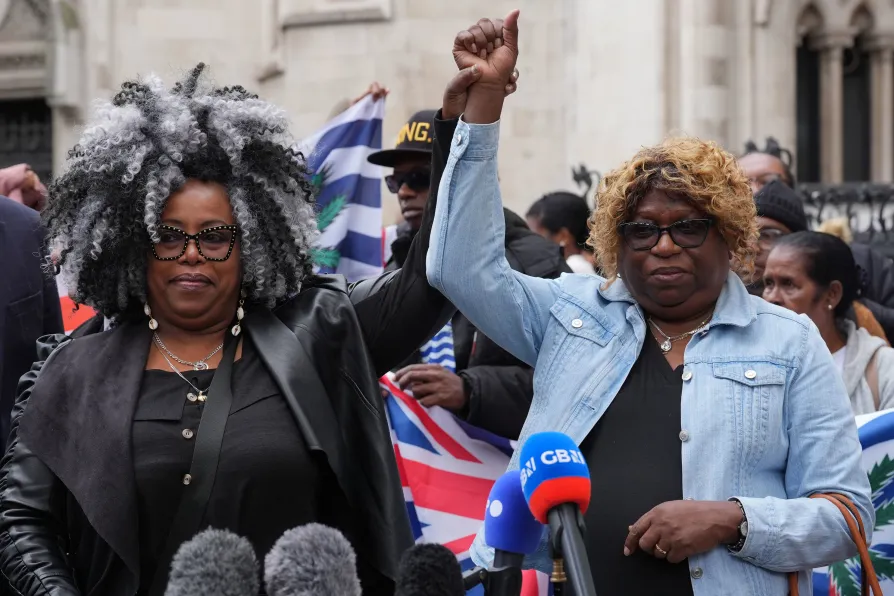As tens of thousands return to the streets for the first national Palestine march of 2026, this movement refuses to be sidelined or silenced, says PETER LEARY
Beatrice Pompe and Bernadette Dugasse have submitted a UN complaint against Labour’s deal with Mauritius, highlighting how exclusion from ancestral lands is denying their right of return and justice for historical abuses, reports ELIZABETH MISTRY

 FORCED DISPLACEMENT: Bertice Pompe (left) and Bernadette Dugasse, two British women born on the Chagos Islands, speak to the media outside the High Court in central London, May 22 2025
FORCED DISPLACEMENT: Bertice Pompe (left) and Bernadette Dugasse, two British women born on the Chagos Islands, speak to the media outside the High Court in central London, May 22 2025
TWO British Chagossian women from the island of Diego Garcia — home to the US military base which is at the heart of the controversial deal that would see Britain passing sovereignty over the Chagos Archipelago to Mauritius — are hoping that the UN human rights body dealing with crimes against women and girls will this week accept their claim that the Labour government’s deal perpetuates a litany of abuses inflicted on Chagossian women which began when they were forcibly displaced when British authorities kicked them off the islands over 50 years ago.
This week saw the second reading of the Diego Garcia Military Base and Indian Ocean Territory Bill in the House of Commons — during which Labour MP Peter Lamb, who has several hundred Chagossians in his Crawley constituency, spoke up to say that he could not support the Bill. He told MPs that: “No matter how important they [national security considerations] might be,” it does not “give us the right to override the Chagossian people’s right to self-determination. We cannot vote to give away these islands, because they are not our islands to give away in the first place.”
Last month, a legal representative for a number of Chagossian women led by Beatrice Pompe and Bernadette Dugasse submitted a new claim of human rights violations to the Committee of the Convention on the Elimination of All Forms of Discrimination Against Women (Cedaw) in Geneva.
Elodie Tranchez, a Geneva-based human rights lawyer working pro bono for the two women filed an interim complaint to Cedaw highlighting several issues — the forced displacement they were subjected to, the ongoing refusal to allow a right of return — something the women (who claim British nationality having been born in what was a British colony) say is not guaranteed under the proposed deal between Britain and Mauritius.
And in what may be one of the first moves of its kind, the women have also submitted a complaint pointing out the resulting inability to carry out cultural traditions and practices discriminates against their heritage as indigenous women.
Having campaigned publicly against the deal in its current form, both say that being excluded from discussions with the Foreign and Commonwealth Office has caused them a great deal of distress.
Speaking exclusively to the Morning Star, Tranchez said that she hoped for a positive response from Cedaw in the next few days.
“The forced displacement had a disproportionate impact on women, and the Bill will lead to further erasure of the Chagossian people. They have been cruelly deprived of access to their land and its natural resources. There are no guarantees that they will be allowed right of return or that they will even be prioritised over other Mauritians.
“We would like to see Cedaw grant interim measures and for the committee to ask Britain to refrain from taking any steps as long as the matter is under discussion.”
The issue must not be rushed through Parliament or brushed under the carpet under the guise of changes at the Foreign Office, added Dugasse.
“Diego Garcia is the place of my birth — I was born under a Union Jack flag. We are British, but we were sacrificed and now, with this new deal, we are being sacrificed again.”













